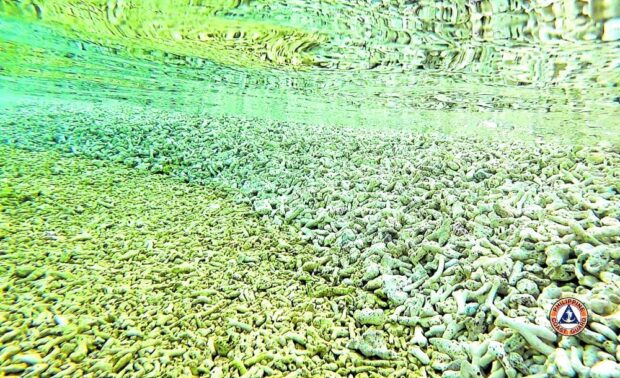Countries urged to invoke High Seas Treaty to protect maritime interests

This photograph taken during a survey by the Philippine Coast Guard (PCG) of the seabed of Escoda (Sabina) Shoal, conducted between Aug. 9 and Sept. 11,2023, shows what appears to be a fresh pile of coral rubble, their bleached color indicating they were dumped there recently. The shoal is about 180 kilometers west of Palawan province. (Photo from PCG)
MANILA, Philippines — Countries like the Philippines may invoke the new international accord known as the ‘High Seas Treaty’ to protect their maritime interest, an expert said on Thursday.
Speaking before a Stratbase ADR forum in Makati City, Tohoku University International Law Professor Nishimoto Kentaro said the High Seas Treaty serves as an additional legal instrument that supports the United Nations Convention on the Law of the Sea (Unclos).
The treaty, also known as the Conservation and Sustainable Use of Marine Biological Diversity of Areas Beyond National Jurisdiction (BBNJ) agreement, ensures the conservation and sustainable use of marine biological diversity of areas beyond a country’s national jurisdiction through international coordination.
The agreement was signed in June 2023 by 86 countries including the Philippines and China.
The ratification of 60 countries is needed for the agreement to enter into force, but to date, only Palau, a Pacific Island country, has ratified the agreement.
Kentaro said that, with the creation of the BBNJ Agreement, “we have what proves to be a global institutional framework for establishing a marine protected area in the South China Sea.”
“If China ratifies the agreement, it will be obligated to comply with any measures that are established by the COP (Conference of the Parties),” Kentaro said.
“China will be expected to behave in a responsible way,” he continued.
China asserts sovereignty in almost the entire South China Sea, including the West Philippine Sea, through its now ten-dash line which used to be a nine dash line.
In 2013, the Philippines questioned China’s nine-dash line before the Permanent Court of Arbitration, but an international tribunal ruling issued in 2016 effectively dismissed Beijing’s sweeping demarcation while ruling heavily in favor of Manila.
The Philippines blamed China for the destruction of corals in Rozul Reef and Escoda (Sabina) Shoal in the West Philippine Sea, but Beijing denied this accusation.
An Asia Maritime Transparency Initiative’s study released on Dec. 18, 2023, however, revealed that China’s island-building activities for military outposts in the South China Sea have been responsible for the destruction of around 19 square kilometers (sq km) of coral reefs, while Chinese fishermen were also culpable for an additional damage of 67 sq. km in their search for giant clams.














